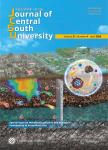Hydration properties and thermal analysis of cement-based materials containing limestone powder
Hydration properties and thermal analysis of cement-based materials containing limestone powder作者机构:State Key Laboratory of Water Resources and Hydropower Engineering ScienceWuhan University Wuhan 430072 China School of Water Resources and Hydropower Engineering Wuhan University Wuhan 430072 China School of Civil Engineering The University of Queensland Brisbane 4072 Australia School of Civil Engineering and Architecture Wuhan University Wuhan 430072 China
出 版 物:《Journal of Central South University》 (中南大学学报(英文版))
年 卷 期:2017年第24卷第12期
页 面:2932-2939页
核心收录:
学科分类:08[工学] 0805[工学-材料科学与工程(可授工学、理学学位)] 080502[工学-材料学]
基 金:Project(51579192) supported by the National Natural Science Foundation of China Project(2013BC0359001) supported by the National Basic Research Program of China Project(201506270058) supported by China Scholarship Council
主 题:limestone powder cement mortar hydration properties thermal properties
摘 要:The hydration and thermal properties of cement-based materials containing various proportions of limestone powder as a partial replacement for ordinary Portland cement, were investigated and reported. Both compressive and flexural strengths of cement mortar with various contents of limestone powder were tested to study the influence of limestone powder on the strength development of resulting mixtures. The hydration heat and its rate of evolution were also tested, which clearly showed that the replacement percentage of limestone powder had significant effects on the total hydration heat but only a modest influence on the rate of heat evolution of cement-limestone binder. Importantly, the reduction coefficient of limestone powder on the hydration heat, needed for estimation of adiabatic temperature rise of cement-limestone binder, was found to be approximately 0.51. Fundamental thermal properties of these concrete mixtures containing limestone powder were also studied. Increasing the percentage of limestone powder resulted in a significant reduction in the adiabatic temperature rise but only a slight increase in other thermal properties such as thermal conductivity, thermal diffusivity and specific heat. In addition, thermal analysis using finite-element modelling indicated that inclusion of limestone powder did not significantly affect the rate of temperature rise nor the occurrence time of the highest temperature at early ages.



